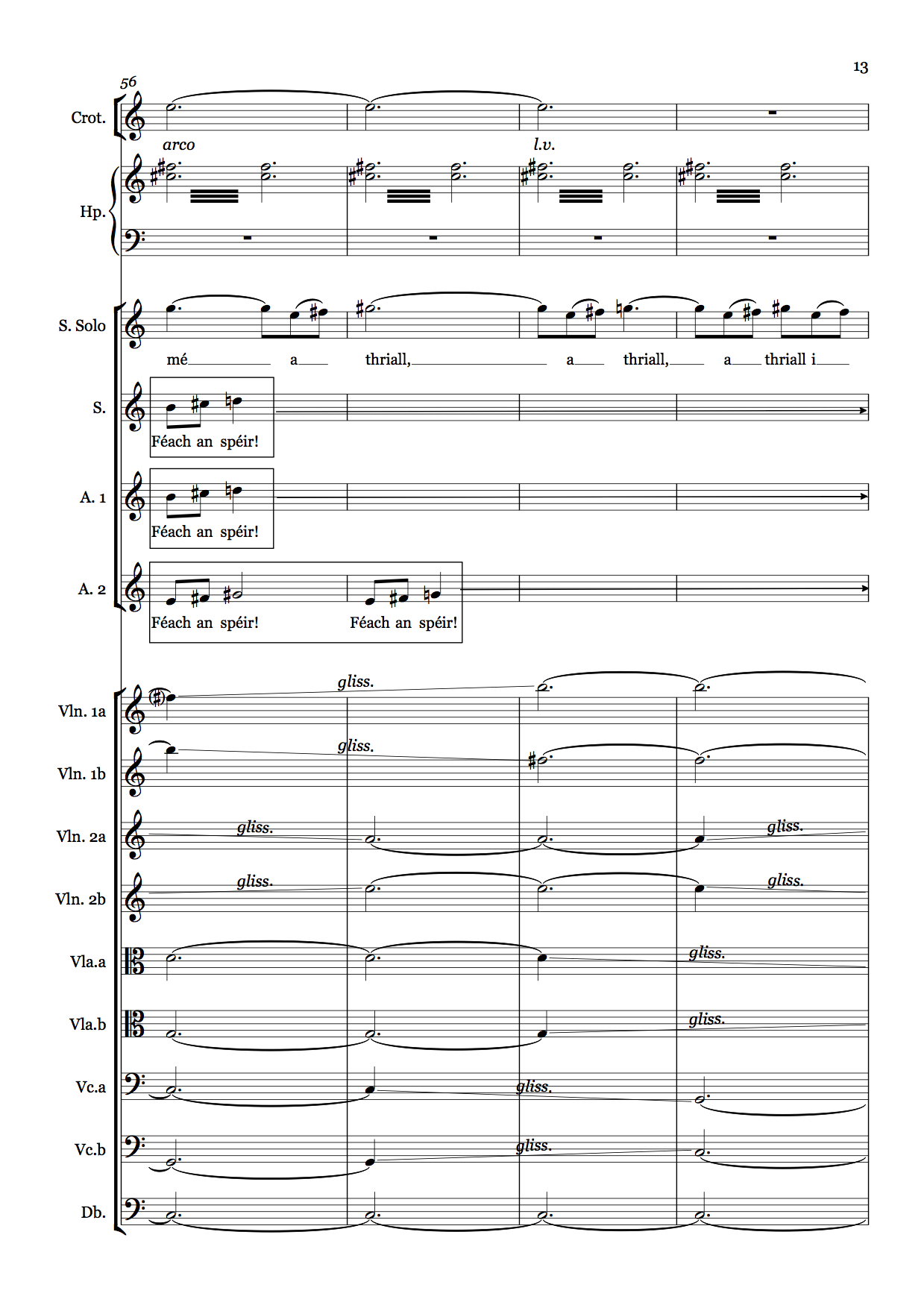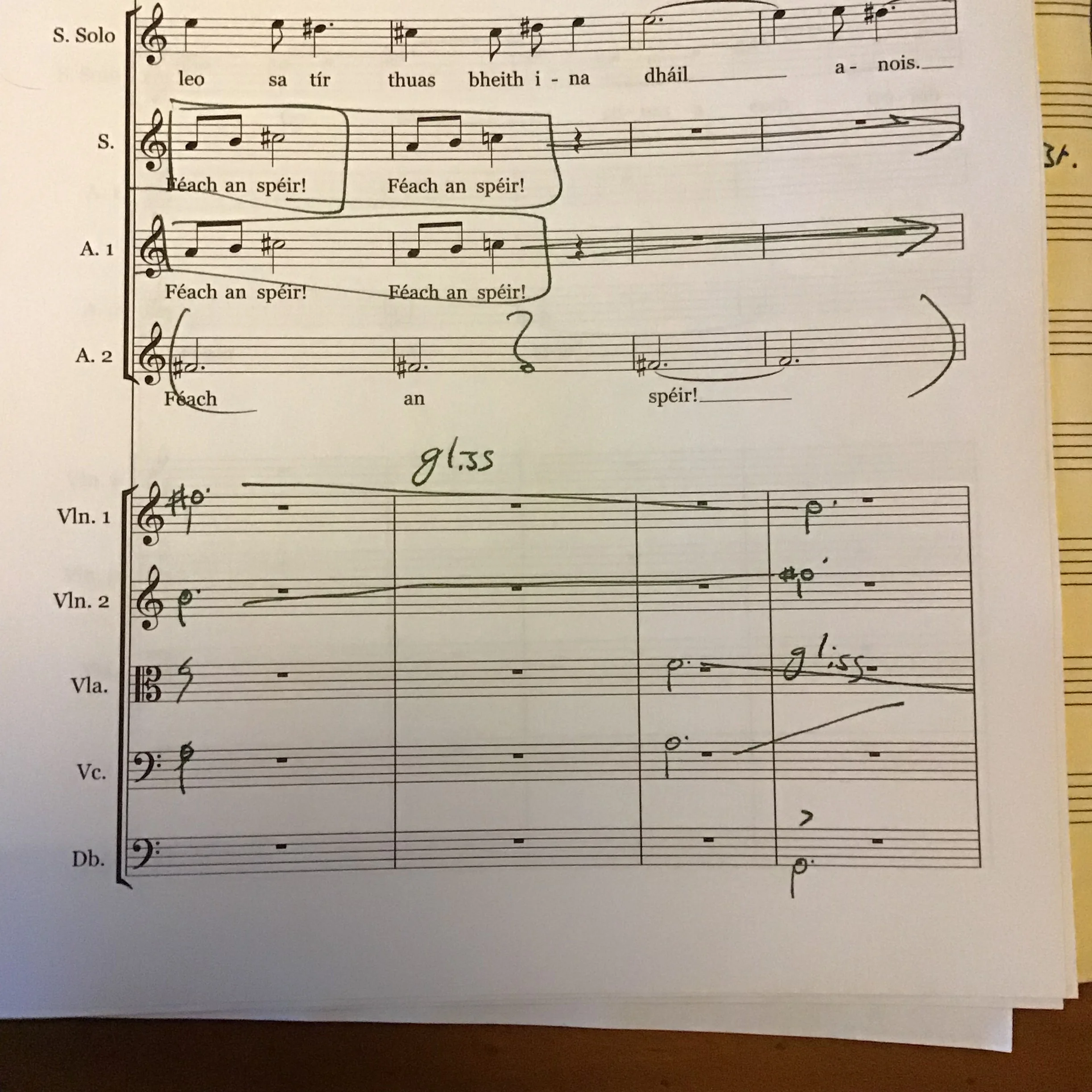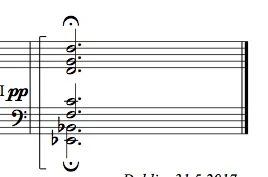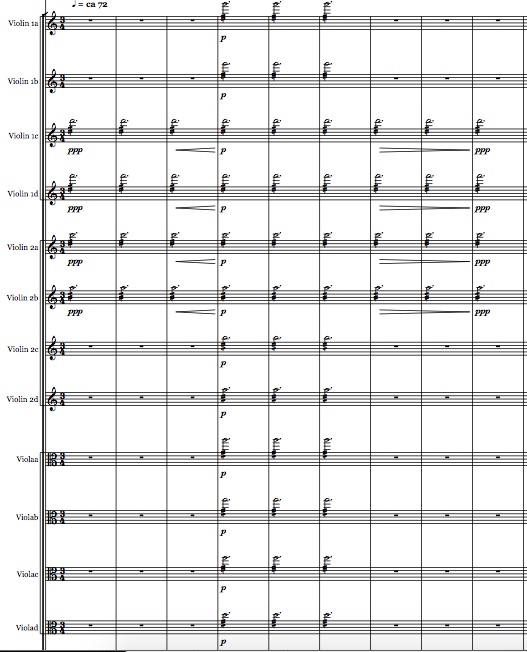10 days in. 10% of the way through the 100 days concept.
Where does the time go?
I’m not too worried about finishing my PhD in time.
What I’m really scared of is finishing at all.
For 3 years, it’s been on my mind most of the time. I’ve put a lot of things aside as things I’ll do “when the PhD is over”.
What I’m really scared of, though, is justifying it all. Not in the sense of defending the work in a Viva Voce, having to stand over it all in an academic context. Even with only about 70% of the thing done, I feel confident in my work in that sense. I’m scared of justifying spending the last 3 years of my 20s focusing so much of my time and energy on one, single, big thing like this.
I think it explains why I took on a couple of ill-advised and frivolous composition things in the early couple of months of the year – all worthy projects, but projects I didn’t have time for. If I hadn’t done them, I’d probably be 90% done with the PhD now and be approaching the ‘i-dotting’ and ‘t-crossing’ phase.
I’ve spent nearly 3 years working harder than I ever thought I would on my composition. Has it been worth it? I think if I look back at the music I was writing 3 years ago, and compare it to the music I’m writing now, that yes, it has been worth it. But even more than that, the PhD is allowing me to produce something of a body of work. Yes, my portfolio is chock-full of smaller pieces – the Christmas Carols, the songs, the organ pieces, the one-off choral pieces like Childish Things or O Sacrum Convivium – but it also contains 2 pieces I probably wouldn’t have composed hadn’t the PhD facilitated, and necessitated, their creation: My Cantata for Men’s Voices and Organ, The Falling Tear, and my current Work in Progress, Amra Choluim Chille. These pieces, 22 minutes and something between 40 and 50 minutes in length respectively, are not pieces I would have seen through in the time I have done so, were it not for the spectre of the PhD hanging over me, demanding that I produce them. And for that, I can only be grateful.
I have 90 more days to write about, but I hope to have the first draft of ACC finished by July 5th, when I’m going to Sweden with St Patrick’s. I hope to be able to print the thing out, and go through it with a big red pen – fixing what needs fixed, cutting what needs cut, extending what needs extending.
After that, who knows what I’ll find to ramble on about. I have 4 Christmas carols due, not to mention the actual commentary to write. I’m also hoping to find time to complete my Organ Sonata for addition to the portfolio, if possible. Otherwise, that’ll be added to the long list of “when the PhD is finished.”
100 Days – Day 9
I think I’ve reached that point in the creative process where there now remains no actual composition to do. All of the creative stuff – the coming up with ideas bit – is, I think, done.
Now for the hard part.
By my reckoning, the piece, Amra Choluim Chille, is about 70% done. What’s left to do feels like a hell of a lot more than 30% of the music though. I have 7 movements – 2 in the middle that are finished (in first draft) and 5 that are very skeletal in nature.
Movement 1
This movement has the most text left to actually set of any movement – 3 of 8 lines remain un set. However, as they refer to later movements, I was waiting to finish up those movements before I come back to complete this movement, which I envision being the last thing I will do.
Movement 2
All of this text is set. There are, however, 4 lines which I am going to change, because of material in Movement 6 that I only wrote this week, and am finalising now.
Movement 3
This was the first movement I composed, and is finished. The orchestration could be refined, but it’s basically finished in first draft.
Movement 4
This movement is quite short – only 6 lines, which are quite similar, so it was a very simple movement to write. I consider it to be the only movement that is totally finished and will be unchanged in the final product, except for small details.
Movement 5
This movement is quite complicated. I wrote the whole first half in Copenhagen last October, and the whole second half last night. However, while the concept of the first half will be the same, the rhythm and notes are going to change – not a lot, but enough for it to be a good 3 days work, I’d say. The vocal parts will probably stay the exact same, but the string writing needs to become more epic.
Movement 6
I have set all of the text in this movement this week, and written a lot of the accompanying parts (see day 5). The last 3-5 lines need the most work, and I need to write the ending, but as it will be exactly the same (more or less) as the beginning, that won’t take long.
Movement 7
I wrote the ending of this movement (and of the whole piece) way back sometime last year – maybe even this time last year, but have been playing around with the rest of it for a long time. I had come up with music for the beginning, but then when I was backstage waiting to start the 1st of the Amsterdam shows of INO’s The Second Violinist, I heard a piccolo player playing a little warm-up motif, which I have turned into a big 5 part passacaglia texture. I’ve retained the original opening material for the second half, and actually it all works a lot better. I still need to work out 5 lines or so of this movement, but they fit into a very distinct and clear harmonic structure, so it will be labour intensive, but not much hard work.
100 Days – Day 8
Enter Marimba
100 Days – Day 7
Dialogues of the Carmelites live broadcast from the Met today. I’m a little bit destroyed.
I’ve always loved the opera, but watching it for the second time, I really noticed how Poulenc musically foreshadows the climactic scene throughout the whole opera – the minor third bass line keeps popping up in unexpected places, so when it finally arrived in the final scene, underneath the triumphant major trumpet motif representing (presumably) the revolution, it left me literally trembling. I also really liked how the director foreshadowed Blanche’s fate with the hanging curtain in the stand-alone doorway in the first scene. It was a very subtle nod to the guillotine that we never actually see.
I have only a single line of my 6th movement left to set, but a lot of string parts still to write. Hopefully I’ll get all of this done tomorrow and early Thursday, so I can at least have 2 movements to talk about in my PhD meeting next week.
After one week of this blog, however, I’ve managed to cut down the amount of work I have left to do by almost a whole movement, leaving me with 2 complete movements, and 5 half-complete movements, 3 of which essentially just need to be ground out and polished off, which is extremely tedious, but at least doesn’t require any actual creativity, which is the hardest part.
I bought myself a printer for my 30th birthday and it arrived today. No more waiting around in print shops just so that I can come home and use Method 2.
*see http://www.eoghandesmond.com/blog/100-days-4
100 Days – Day 6
Composition Superstition
Some decent work today – got up, made coffee, had breakfast. Usual routine. Sat down to work and wrote a really decent few bars, including setting 2 more lines, leaving me with only 3 lines of movement 6 to write, one of which I definitely have planned.
Then I had a quick shower, spot of lunch, sat down to work again and… nothing. I sat staring at my screen, my manuscript, my text, for a good 40 minutes, and nothing happened.
What had changed in those few minutes?
I was no longer wearing my horrible ratty old cardigan with one elbow patch falling off that I’d been wearing all morning. It sounds mad, but I definitely think there's something about wearing that cardigan that makes me work better.
100 Days – Day 5
Progress – and Frustration.
Lots of progress today – I always seem to get a lot done on Sundays, once I’ve finished my cathedral work for the day and had 40 winks. I’ve decided how I’m going to set the rest of the text of the 6th movement I’ve been working on, and I’ve mapped out the string parts for the whole section I set on Thursday. This is where the frustrations kick in.
It was one thing for composers of by-gone centuries. When working on multi-instrument pieces, they either had to have an ensemble there ready to satisfy their want to hear what they’ve written live, or trust their ears. In one way, composers these days have it too easy – programs like Sibelius, Finale, Dorico and Musescore have given us the ability to hear mock-ups of whatever we’re writing, as we write it. I personally often find this crippling though. For starters, some of the samples (organ, for example) are so unbelievably bad that when I’ve been closely working into Sibelius for a day or two, I start to worry that the piece itself is bad. I’m usually proven wrong (as was the case when I first heard a recent organ piece that I composed for David O’Shea – more on that later) but it’s still quite disheartening. Composers of bygone centuries could presumably trust the orchestras in their heads. Maybe not…
Anyway, it’s even more frustrating when you’re working on the kind of piece I’m working on – lots of aleatoric vocal writing, which should create a lovely rustling overlapping effect, and lots of string glisses. The way I’ve noted both of these, a live performance should sound really eerie and cool and disturbing. The way I’ve noted both of these, Sibelius sounds like absolute shite.
I know I could probably fork out and buy loads of really good samples (or hire some people to record it for me during the week) but I’ve decided to trust my inner ear on this one and ignore what Sibelius is doing to my lovely, lovely music – pictured below.
Glisses and aleatoricisims and bowed crotales, OH MY!
100 Days – Day 4
The Ways I Compose
Way number 1: The Old Fashioned Way.
Way number 2: The New Old Fashioned Way (Like Way number 1, but print out the good stuff first and add string parts manually)
Way number 3: Music is over-rated. Use your words.
Way number 4: Commune with desk for inspiration.
100 Days – Day 3
Polyphonic Rigor > Rigor Mortis*
In other words, polyphony means that even if your own line is boring, it’s ok, because you’re serving the satisfaction of another part, and the whole is superb.
Musical examples to follow.
* Dominica Williams, 10.5.19
100 Days – Day 2
Today I set 6 more lines of the movement I’ve been working on for upper voices, which in a way seems like I tripled my output from yesterday, but in reality means that tomorrow I probably won’t set any new text. What I’ve written is very skeletal and sketchy, and I’ve spent a great deal of time trying to figure out the best way to convey the aleatoric elements of the piece, before realising just now on the luas home that my first instinct, which I’d forgotten about in the heat of the work, was not only the best idea but also the convention. Good news – this means that I don’t have to do any more tinkering with notation and can instead spend all that time tinkering with sibelius… Once I’ve figured out how it should all look, I might post a picture.
I also haven’t actually written any of the string or harp parts for those 6 lines – just the vocal parts, so tomorrow I’ll probably focus on filling out what I wrote today. The vocal lines all snake chromatically upwards, to convey a sense of rising tension in the mourning, but also to reflect the words Féach an spéir, which I’ve chosen for the sopranos and altos to repeat ad lib under the next 4 lines, sung by a soprano soloist. I think that the consonants “F”, “ch” and “sp” will be very interesting to listen to in an aleatoric texture. Underneath all of this, I think the strings can build up a chord (pictured below) that occurs at several structurally significant points throughout the work as a whole, but always glissando downwards before too long. The combination of the voices moving upwards while the strings are moving downwards should help convey a sense of dizziness or something. Ask me again when I hear it performed by real instruments.
This evening I did what I’ve been putting of for a number of years and finally got new headshots! I’ve only had the lovely one on the home-page of this site that we had done for the 10th anniversary of the Irish Composers Collective for the longest time, but the brilliant Miriam Kaczor was saying she had some studio times available so I pounced. Watch this space for updates!
The “structurally significant” chord.
100 Days – Day 1
With my PhD due date looming on the horizon, a little under 4 months away, I’ve decided to try to keep myself honest (and come up with a new way of procrastinating) by blogging about how I’m doing.
Buoyed by the lovely review of my Oxen of the Sun in this month’s Choir and Organ*, today I set about tackling the only movement of my large PhD piece (Amra Choluim Chille, henceforth known as ACC) that I had yet to start. It’s the 6th of 7 movements, and I had decided several months ago for this movement to be for upper voices, strings and harp only – no tenors or basses. This is because the text relates to the grief of the Uí Néill clan upon hearing of the death of St Columba. I have some vague idea in my head that traditionally, in Ireland, only the women were involved in keening over the dead body – often in chorus, lead by a professional bean chaointe.
While at the end of today I have only set the first 2 of 13 lines in this movement, I have planned more or less the whole structure, based on an octatonic ascending texture that I developed for my commission for New Dublin Voices entitled Comrades. In that piece it is quick, regular and energised, to convey the words “free through the world your spirit goes.” Here, however, it is going to be much slower to develop, and I will probably use aleatoric techniques, so that there is something more chaotic and mournful about how the texture builds, to give meaning to the words Is deimhin: ní och aon-tí, ní och aon-téite,/ Is trom an tuath anois i ngreim an scéil.**
I am bringing back a motif from the very beginning of the piece, which I think of as the “Cross” motif, because the way I’ve laid out the strings, it forms the image of a cross. Here, that motif is used on the words Mac na Croiche a ainm;***. For some reason, whenever I think about the beginning of the piece, the words “Hold thou the cross before my closing eyes” come into my mind – I have this image of the dying St Columba looking at the sky and seeing a shining cross formed out of light and clouds and rain and so on.
Don’t ask me why.
*“quite beautiful... is Eoghan Desmond’s extraordinary Oxen of the Sun, with its Joycean brio and deceptive subtlety.”
** Truly: not the grieving of one household, nor the sighing of one harp string, sad are all the people at the wounding word.
***Son of the Cross his name.
Page 1 of Amra Choluim Chille (in progress)







